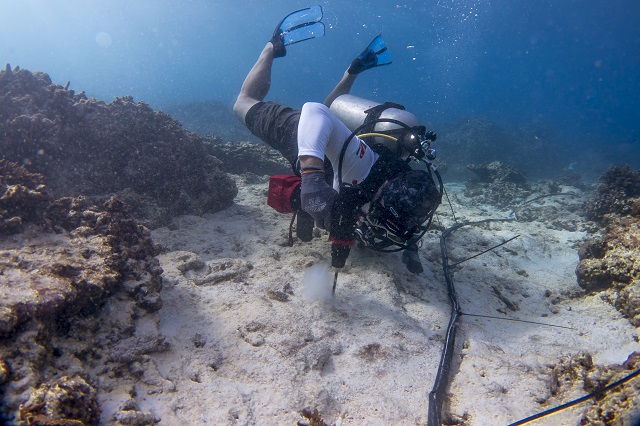Seychelles Fregate Island Private, a luxury eco-retreat, is partnering with two international organisations based in Switzerland for its first coral restoration project.
The island’s conservation manager, Richard Baxter, told SNA on Monday that the reason for the partnership was to get help to take the habitat restoration experience underwater.
In support of the International Year of the Reef 2018, a new coral propagation project has been conceived off the coastal waters of Fregate, Seychelles’ easternmost granitic island, in partnership with Coralive.org and Blancpain Ocean Commitment.
The Coralive.org is a Swiss-based environmental organisation passionate for the ocean, operating worldwide to help protect, manage and restore coastal ecosystems. The Blancpain Ocean Commitment supports the exploration and preservation of the oceans under the world’s oldest watchmaking brand. Blancpain’s environmental initiatives are for the preservation of the oceans, focusing on long-term projects.
Fregate Island is home to many rare and exotic species from the critically endangered Wrights Gardenia to the indigenous giant tenebrionid beetle, and the conservation team is dedicated to restoring the natural habitat and saved the endemic Seychelles magpie robin from extinction.
The project involved installing eight metal structures on top of the affected coral reef and coral fragments collected from surrounding areas were attached to the structures. These coral fragments are being sustained by an electrical impulse of the mineral accretion technology.
The mineral accretion technology is a method that applies safe, low voltage electrical currents through seawater, causing dissolved minerals to crystallise on structures, growing into a white limestone similar to that which naturally makes up coral reefs and tropical white sand beaches.
All the artificial structures have been put in place by the Coralive.org. The locations have been carefully chosen and identified as areas which were severely damaged by the most recent bleaching event in 1998, which destroyed close to 90 percent all corals in the Seychelles, an archipelago in the western Indian Ocean.
The artificial structures have been put in place by the Coralive.org in carefully selected locations. (Fregat Island Private) Photo License: CC-BY
The chief executive of Coralive.org, Ahmad Allahgholi, has acknowledged that the project is an important step in being able to ‘scale-up’ coral restoration initiatives in the region.
“Corals are under greater threat than ever before, due to such factors as overfishing and climate change which results in bleaching, overfishing and tropical storms. These scenarios make coral restoration necessary in order to help nature recover faster and become more resilient to future threats. I am very excited that Frégate Island Private, with the support of Blancpain, gave Coralive.org the opportunity to initiate a project to jumpstart the regenerating process,” he said.
Talking about what he expects from the project, the Fregate Island conservation manager said, “We aim to show the method of mineral accretion is a viable conservation method to protect Seychelles’ reefs. In two years’ time, we expect to see corals cover the mineral accretion structures faster than the coral nursery method. The next steps will hope to scale the method up to larger areas of damaged reef.”
Source: Seychelles News Agency

